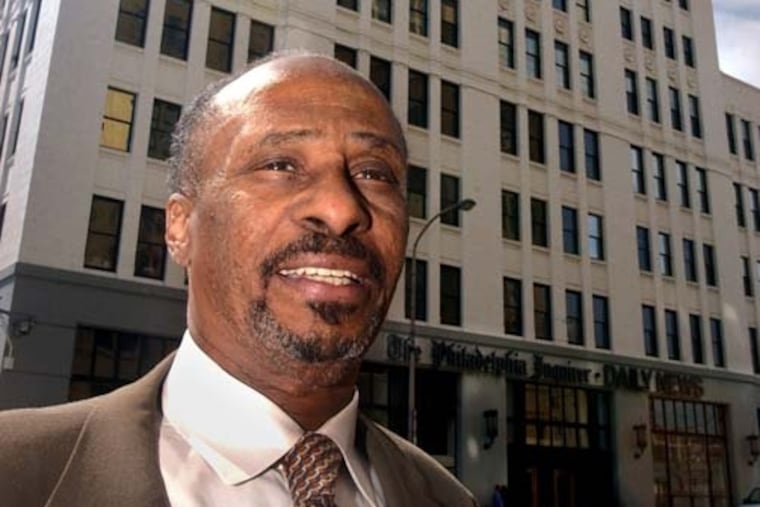Philly wants to rename the Andrew Jackson elementary school. The Inquirer’s legendary Acel Moore gets my vote. | Jenice Armstrong
A Pulitzer Prize winner who helped change how newspapers cover the Black community, Moore represented the best of the neighborhood — much more than the slave-owning former president ever could.

The late, legendary Inquirer columnist Acel Moore used to quip that there are two kinds of people: “Those who are from South Philly and those who wish they were.”
A Pulitzer Prize winner who helped change how newspapers cover the Black community, he represented the best of the neighborhood — much more than the slave-owning former President Andrew Jackson ever could. Moore was devoted to South Philly and to this city.
That’s why I wholeheartedly support a plan by Philadelphia School District officials to remove Jackson’s name from the elementary school at 12th and Federal Streets and replace it, possibly with Moore’s name. The contenders also include pioneering educator Fanny Jackson Coppin, abolitionist William Still, and civil rights activist Barbara Rose Johns.
They all are great candidates, but I really hope Moore gets the nod.
It’s not just because I worked with Moore and was in awe of him. Moore is much more contemporary than the others in the running. It wasn’t all that long ago that he walked the same streets that the Jackson students do now. The paper where he worked for 43 years still publishes and the story of Moore’s rise through its ranks against all kinds of odds is inspirational. He’s a hero to many — and will be to the students once they learn his story.
“The children now attending Andrew Jackson School may well be part of the last generation to recollect when daily newspapers were still printed and delivered,” Moore’s wife, Linda Wright Moore, pointed out on Facebook.
He was a proud graduate of Philadelphia public schools, having attended Smith Elementary and Barratt Middle School, two schools in Point Breeze that no longer exist, and Overbrook High School.
Moore got into journalism in 1962, back when there were so few African Americans at The Inquirer that a group of ministers threatened a boycott. That led to Moore being hired as a copy boy. He was 22 and fresh out of the military but still had to endure the indignity of being called “boy” until the day he stopped the practice by explaining how insulting it was and telling a rewrite man that if he said it again, “I would meet him after work and we could discuss it outside.”
When he became a reporter in 1968, Moore had the distinction of being only the fourth Black reporter hired by The Inquirer, even though the paper had been in existence since 1829. His beat was covering police news in North Philadelphia — which didn’t initially go over well with the cops. Over the years, he worked his way up to columnist and a member of the editorial board and, later, associate editor emeritus. Along the way, Moore pushed The Inquirer to hire African American reporters and improve its coverage of Black people. In 1977, he won a Pulitzer Prize for investigative reporting for his work, along with Wendell Rawls Jr., on the conditions in the Farview State Hospital for the mentally ill.
He was also a trailblazer for the profession. Moore was one of the founding members of the Philadelphia Association of Black Journalists, which would help seed what became the National Association of Black Journalists, an important voice in the industry to this day. In 1985, he created a journalism workshop for high school students that bears his name and is still in existence.
By the time I met Moore during the early 1990s, he was a journalism legend. I was a business reporter at the Daily News at the time and admired how fearless Moore was about pushing back against management and unfair coverage.
It was a sad day when Moore died in 2016 at the age of 75.
One of his mentees, retired Inquirer reporter Vernon Clark, wrote a letter that same year to School Superintendent William R. Hite Jr. asking that a public school be named after Moore. Clark never got a response. Then, in February, in honor of Black History Month, he posted his letter to Hite on Facebook and began talking up the idea.
“We’ve only got one statue of a Black man in this city,” pointed out Clark, who attended the now-defunct Art Peters Memorial Fellowship Program for copy editors that Moore established in 1979. “Acel Moore has done more for this city and more for these communities than Andrew Jackson ever did.”
It’s a shame that the district allowed generations of children to attend a school named after a racist like Jackson. But kudos to school officials for agreeing to change the name now. When I checked late Wednesday, fewer than 400 had weighed in. Principal Kelly Espinosa said voting is open to alumni, parents, students, and people from the catchment. People can vote online or in person with paper ballots at the school. The deadline is 5:30 p.m. May 7.
Moore really stood up for Philly. Here’s hoping people will stand up for him.